|
|
|
Sort Order |
|
|
|
Items / Page
|
|
|
|
|
|
|
| Srl | Item |
| 1 |
ID:
144064
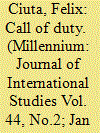

|
|
|
|
|
| Summary/Abstract |
This article attempts to further develop the IR research agenda on video games. The argument starts with a critique of the narrow focus on war-themed blockbuster games of current IR work on video games. I argue that this narrow view of IR and of video games is unsustainable and counterproductive, and has led to the positioning of IR as a regime of value with an unwarranted focus on the ideological effects of video games, and also to a paradoxical closing off of its research agenda. In the second half of the article I attempt to sketch two directions of research that could help overcome these initial limitations. The first outlines the potential for the IR study of the global aesthetic economy of video games, and the differentiated distribution of its regimes of value. The second encourages the study of game-worlds as practical-theoretical spaces where a particular relationship between academic subjectivity and its objects is constituted. The significance of this argument transcends IR video games research: it has relevance for cross-disciplinary issues regarding the status of academic moral-aesthetic judgements about cultural artfacts and practices; the relationship between academic and ‘popular’ knowledge; and the potential for political mobilisation at the interface of entertainment and social critique.
|
|
|
|
|
|
|
|
|
|
|
|
|
|
|
|
| 2 |
ID:
144067
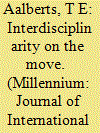

|
|
|
|
|
| Summary/Abstract |
This contribution to the forum discusses The Status of Law in World Society from the perspective of interdisciplinary research in International Law and International Relations. While problematising the mediation on interdisciplinarity itself, I suggest that the remainder of the book is an example of reflexive interdisciplinarity, which uses cross-disciplinary encounters to learn about disciplinary blindspots, hidden assumptions or silences, and to destabilise its certain knowledges and common senses. This is interdisciplinarity as counter-disciplinarity proper. Kratochwil shows how interdisciplinary research can be a non-imperialist, enriching and stimulating conversation, precisely because it refrains from dictating this in the form of a set research agenda with a delineated roadmap. The Status of Law instead highlights the scholarly merits of posing questions, being puzzled and having contestations as more important and productive features for our academic endeavour and interdisciplinarity itself.
|
|
|
|
|
|
|
|
|
|
|
|
|
|
|
|
| 3 |
ID:
144066
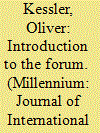

|
|
|
|
|
| Summary/Abstract |
This introduction positions The Status of Law in World Society in the context of Friedrich V. Kratochwil’s previous contributions to International Relations. It outlines how Kratochwil has replaced the rhetorical tradition that featured prominently in Rules, Norms and Decisions by practice theories and pragmatism in his new book. It then provides an overview of the nine new Meditations contained in The Status of Law, and introduces each contribution to this Forum.
|
|
|
|
|
|
|
|
|
|
|
|
|
|
|
|
| 4 |
ID:
144068
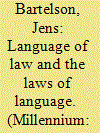

|
|
|
|
|
| Summary/Abstract |
The Status of Law in World Society by Friedrich Kratochwil is a sophisticated attempt to reassert the importance of international law in a globalised world by grounding it in the actual practices of legal reasoning. Yet this attempt to ground normativity in practice strikes me as problematic. As I shall argue, what law is cannot be determined with reference to legal practices only, but will depend on the fulfillment of certain background requirements which themselves stand in need of further justification. Thus the recourse to linguistic practice is beset by an ambivalence that stems from the fact that language and law always already are intertwined, an ambivalence that cannot therefore be overcome with recourse to either. If it is the case that law has a language of its own, we must also be prepared to admit that language has its own laws. What then is gained by the recourse to linguistic practice is not so much a resolution but rather a temporary displacement of indeterminacy from the realm of law to that of language.
|
|
|
|
|
|
|
|
|
|
|
|
|
|
|
|
| 5 |
ID:
144071
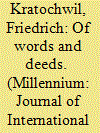

|
|
|
|
|
| Summary/Abstract |
In this response, I answer some of the critiques that were raised in the Forum. In particular, this response clarifies the role of practices and pragmatism, the limits of inter-disciplinarity, and the authority and assumed foundations of law in a post-foundational time. Even though this contribution does not attempt to solve these issues once and for all, it provides avenues for future engagement.
|
|
|
|
|
|
|
|
|
|
|
|
|
|
|
|
| 6 |
ID:
144063
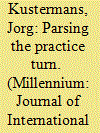

|
|
|
|
|
| Summary/Abstract |
A substantial body of literature centers on the concept of ‘practice’. This article parses the practice turn in International Relations. It suggests that the meaning of ‘practice’ is a moving target. Sometimes it means process. Sometimes it refers to a particular type of knowledge and related action. And sometimes it is used as a quasi-synonym for institution. There are actually three concepts animating the practice turn: ‘practice’, ‘practical knowledge’, and ‘practices’. These concepts hail from different intellectual pastures and lead to different ways of explaining and understanding international relations. The article introduces the three concepts, explains how each concept entails a particular interpretation of the nature and possibility of change, as well as affords a particular theory of peace(making).
|
|
|
|
|
|
|
|
|
|
|
|
|
|
|
|
| 7 |
ID:
144070
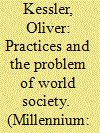

|
|
|
|
|
| Summary/Abstract |
This contribution explores The Status of Law in World Society by looking at the practice turn in particular. Without challenging Kratochwil’s interest in practices per se, this contribution poses two questions: first, it acknowledges that the ‘practice turn’ itself is, like every intellectual movement, ambiguous with conflicting trends and developments. One of these ambiguities, however, concerns the position of the observer. Leaving this position undefined, the practice turn transports this ambiguity into constructivism with important repercussions on what constructivists assume to know and where the boundaries of their possible critique are. Second, this contribution asks whether there is a conflict between an interest in practices and the question of order. In particular, the latter incorporates the question of the ‘third’ that Kratochwil acknowledges, but does not develop in more detail.
|
|
|
|
|
|
|
|
|
|
|
|
|
|
|
|
| 8 |
ID:
144065
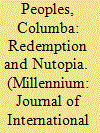

|
|
|
|
|
| Summary/Abstract |
What should the scope of nuclear critique within international studies be? This article addresses that question by making two interrelated arguments. First that political programmes of international nuclear order are crucially underpinned by what is termed here as ‘nutopianism’: a mode of understanding nuclear power that is imbued with a spirit of technological optimism in relation to ‘peaceful’ nuclear power, but simultaneously qualified by an awareness of the destructive uses and catastrophic potentialities of nuclear weapons. Second, that such nutopianism is in turn predicated on the ‘saving power’ of ‘the atom’: the assumption that nuclear power has redeeming features crucial to human progress and economic prosperity, the development of which should be facilitated within the structures of international order. The article makes the case that although critical thought within international studies focuses on nuclear weapons within international order, it has tended to remain largely silent on the issue of ‘civil’ nuclear power beyond nuclear weapons and the complex imbrication between the two. On that basis the article considers whether a more holistic and expansive form of nuclear critique is both possible and necessary.
|
|
|
|
|
|
|
|
|
|
|
|
|
|
|
|
| 9 |
ID:
144069
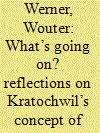

|
|
|
|
|
| Summary/Abstract |
This article focuses on two conceptual puzzles that arise out of Kratochwil’s concept of law. The first is the dual meaning of the questions ‘what is the law’ and ‘what is society’? I will argue that a sociological approach to these questions is unable to do justice to the specific position of the legal practitioner, for whom then these questions are first and foremost normative ones with possible far-reaching implications. The second is the relation between the validity and the binding force of law. In line with institutional approaches to law, I argue that legal language cannot be reduced to one form of linguistic practice, the production of binding decisions and norms of conduct. I will show how a broader conception of law as a form of linguistic activity opens up new research agendas in (international) law.
|
|
|
|
|
|
|
|
|
|
|
|
|
|
|
|
|
|
|
|
|